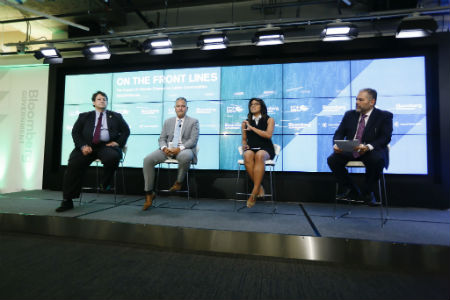On the Front Lines: Climate Change y el Voto Latino

Maria Urbina and other panelists talk about the environment as a voting issue for Latinos at a Bloomberg Government event cosponsored by Environmental Defense Fund and the Hispanic Federation.
Bloomberg
By Lucía Oliva Hennelly, Campaign Manager for New Climate Partnerships at EDF Action and Maria Urbina, Vice President of Politics and National Campaigns at Voto Latino Action Network.
What would it take to make “the environment” a potent voting issue for the growing Latino electorate? This is the question probed among thought leaders this Hispanic Heritage Month at a Bloomberg Government event sponsored by Environmental Defense Fund (EDF) and Hispanic Federation in Washington, DC. However, the challenge isn’t that environmental issues are weak voting issues for Latino voters; it is that environmental issues are too often defined as issues unrelated to those that mobilize Latinos, rather than issues interconnected with the most pressing concerns of Latinos, like wages, health, and education – especially for young Latino voters.
Public polling has demonstrated that the only two issues Latinos consistently rank as “very important” – at 80 percent or higher rates, year after year – are immigration and the environment, according to Dr. Edward Vargas, Senior Analyst at the national polling firm Latino Decisions. This holds true across age groups, from the 60+ crowd to Hispanic millennials. It’s also consistent across the conservative/liberal spectrum and in spite of citizenship status. Yet, the mainstream perpetuates the notion that Latino voters only care about immigration reform. Meanwhile, environmental issues continue to be broadly defined as a middle class or upper class thing, a “luxury” issue that working class people don’t have time to think about.
The high levels of concern Latinos feel for the environment shouldn’t be a surprise, though. Latinos make up high numbers of those in California’s Central Valley who have had the direct experience of wells running dry due to the state’s ongoing drought. They also make up significant numbers in areas where climate-exacerbated extreme weather is hitting home, from flooding in places like Florida to extreme heat in Arizona and Nevada to stronger hurricanes in New York and New Jersey. Our cultures hold connections to the land, and we see how our countries of origin are affected by climate change. And many Latinos know we are often among the communities of color and low income communities hit first and worst by climate impacts, pollution, or environmental degradation.
For young Hispanics, these close-to-home environmental impacts have never been “environmental issues;” they are issues affecting our entire lives — our health, our jobs, our wellbeing, and our dignity and the dignity of our families. We know Latinos are often disproportionately impacted by environmental challenges, so addressing environmental problems is inextricably tied to inclusion and representation, and to the broader call for social justice, racial justice – and, of course, environmental justice.
This is what motivates young voters: voting for systems change, not “issue” impact; voting for new, more just realities; voting for the multi-faceted future we want to live into. Each year, 800,000 American Latinos turn 18, voting age, and these young voters are taking action on environmental issues. For this generation, they are understood through the lens of intersectionality, a reflection of the complex world we live in today.
This election season, it’s time to change the narrative. Environmental issues are Latino issues, and politicians and platforms alike need to address environmental issues in the ways Latinos care about them, and with solutions that will reach them. 3.2 million of the 4 million new Latino voters this cycle just aged into the electorate and when Latinos are registered to vote, they turn out at rates as high as their counter parts in other communities. As the Latino electorate grows and young Hispanic voters continue to mature in their political engagement and political identity, addressing the intersections of environmental, racial, and social justice will be a determining factor in who wins el voto Latino.



